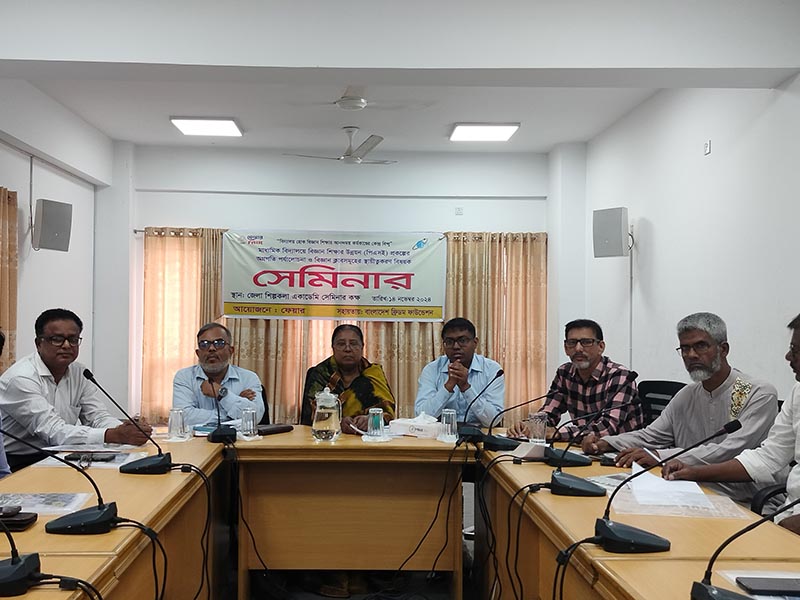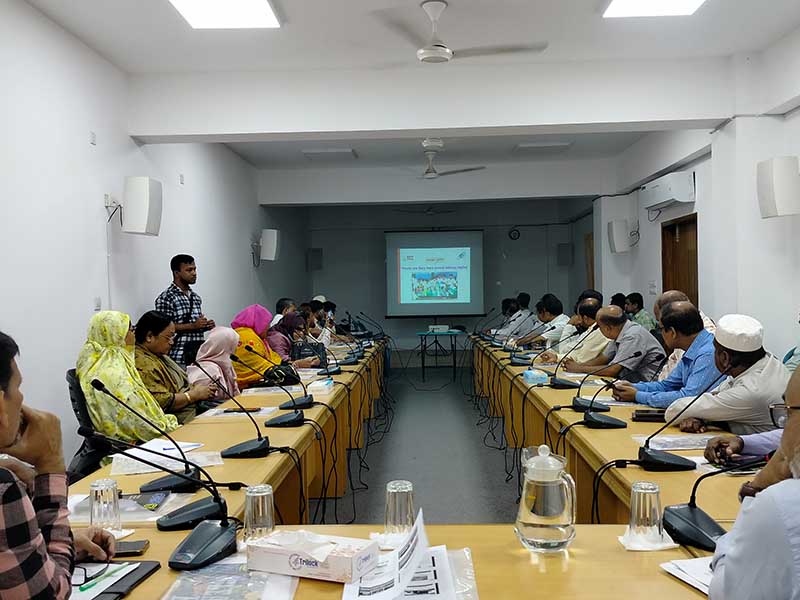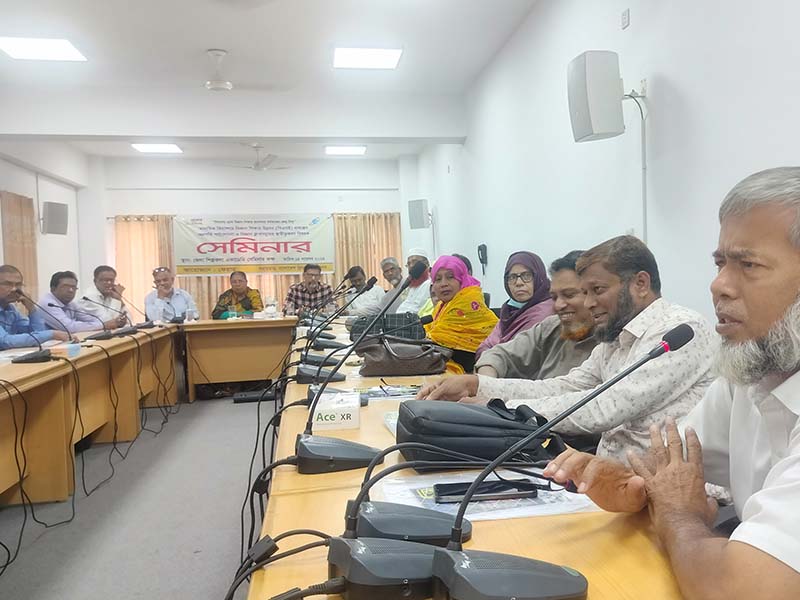Sustainability and Progress of Science Clubs 2024 | FAIR Seminar Insights

Sustainability and Progress of Science Clubs was the central theme of a groundbreaking seminar organized by FAIR, in collaboration with the Bangladesh Freedom Foundation. Titled “Sustainability and Progress Review of Science Clubs 2024,” the seminar brought together school leaders, science club representatives, administrative officials, media personnel, and civil society members to discuss the progress, challenges, and future of science clubs in secondary schools and madrasahs across Kushtia district.
Date: November 14, 2024
Venue: Kushtia District Shilpakala Academy
Promoting Science Education Through Collaboration
Presided over by FAIR’s Vice-Chairman Ms. Tajnihar Begum, the seminar was attended by notable figures, including:
- Chief Guest: Mr. Partha Pratim Shil, Upazila Executive Officer
- Special Guests:
- Mr. Amirul Islam, District Education Officer (Additional Charge)
- Mr. Shamim Ahmed Khan, Upazila Secondary Education Officer
The seminar’s opening address was delivered by Mr. Dewan Akhtaruzzaman, Director of FAIR.

Participants:
The event, focusing on the Sustainability and Progress of Science Clubs, saw active participation from headmasters of both project-included and independent schools, science club representatives, and local media professionals. It served as a platform to evaluate the success of science clubs and chart a roadmap for future initiatives.
Insights from Key Guests
Mr. Partha Pratim Shil (Chief Guest, Upazila Executive Officer):
“Fostering a scientific mindset is crucial for tackling the challenges of the 21st century,” remarked Mr. Shil. He emphasized the need for ensuring the proper utilization of school laboratories and computer facilities to enhance practical learning experiences for students.
He further highlighted how science clubs provide students with hands-on opportunities to explore science, thereby eliminating science-related apprehensions. He stressed the importance of teacher training and modern tools to enhance the effectiveness of science education.
Mr. Amirul Islam (Special Guest, District Education Officer):
“Science clubs are milestones in cultivating innovative thinking among students,” noted Mr. Islam. He pointed out that the utilization of laboratories and technological resources empowers students to address future challenges with confidence and competence.
Mr. Shamim Ahmed Khan (Upazila Secondary Education Officer):
FAIR’s initiative has opened new avenues for science education in schools, said Mr. Khan. He urged for increasing the frequency of practical science classes to strengthen the foundation of scientific learning among students.
He also recommended administrative support for registering science clubs and emphasized the need for dedicated funding to support student-led innovative projects.
Mr. Dewan Akhtaruzzaman (Director, FAIR):
“Our mission is to create opportunities for every school to embrace science club activities and ensure their sustainability and progress of science clubs for a long-lasting impact,” stated Mr. Akhtaruzzaman. He emphasized the significance of hands-on learning and research-based activities in fostering students’ innovative thinking and analytical skills.
Science Clubs: Bridging the Gap Between Theory and Practice
Achievements of Science Clubs
The seminar showcased the significant impact of science clubs in bridging the gap between theoretical knowledge and practical application. FAIR’s support has enabled science clubs to facilitate innovative projects, research, and competitions that inspire students to think creatively and solve real-world problems.
Success Stories
- Horinarayanpur Girls High School: Principal Md. Ekramul Hossain shared that FAIR’s support has enriched science education in his school. Students now actively engage in practical classes and participate in competitions, fostering their interest in science.
- Laxmipur Hasanbagh Girls High School: Principal Shamsul Alam praised FAIR’s initiatives, highlighting that the number of science students in his school increased from 4 to 17 due to science club activities and access to laboratory facilities.
- Jhaudia High School: Principal Uttam Kumar Biswas proudly mentioned a former science club president who earned a scholarship to study in Japan, showcasing how science clubs have significantly increased students’ interest in science and research.
- Dinmoni High School: Principal Salauddin Khan attributed the rise in science enrollments in his school to FAIR’s contributions. He noted that science club activities and lab access have inspired students to dream of becoming innovators and scientists.
- Barkhada High School: Principal Ansar Ali shared how science clubs in his school have fostered creativity and innovation. Students actively participate in local competitions and have achieved remarkable success.
Empowering Students Through Science Clubs
Perspectives from Club Presidents
- Galileo Science Club, Abdalpur High School: President Md. Abdullah Al Mahin stated, “Science club activities have eliminated our fear of science and encouraged us to think innovatively. We have also undertaken tree-planting and event-organizing projects funded by member contributions.”
- Rutherford Science Club, Begum Hamida Siddiq School and College: President Nusrat Jahan Sarmine shared, “Participating in research-based activities through our club has boosted our confidence and prepared us for the future. Our club’s activities are inspiring students to engage actively and meaningfully.”
- Discovery Science Club, Barkhada High School: President Md. Zubayer Islam said, “Through our club, we are conducting scientific experiments that help us understand science practically. This experience is inspiring us to pursue careers as future scientists.”
Media and Community Feedback
- Banglavision TV (Journalist Hasan Ali): “FAIR’s initiatives are commendable for fostering scientific curiosity and innovative thinking among students. Recognizing and supporting teachers’ efforts will further accelerate the progress of science education.”
- Channel 24 (Journalist Sharif Biswas): “FAIR has not only increased students’ interest in science but also encouraged moral education alongside scientific learning. This holistic approach will contribute significantly to societal advancement.”

Recommendations
The seminar concluded with several recommendations to further enhance the effectiveness of science clubs:
- Simplifying the registration process for science clubs.
- Allocating dedicated funding for science club activities.
- Conducting regular teacher training programs.
- Establishing a national network of science clubs to facilitate experience sharing.
- Recognizing exceptional contributions through awards and scholarships.
Conclusion
The seminar concluded with speakers lauding the eloquent presentations by science club presidents, which highlighted their leadership skills and innovative thinking. These contributions underscored the importance of the Sustainability and Progress of Science Clubs in fostering future leaders in science and technology.
FAIR’s initiatives continue to inspire a generation of students to dream big and think innovatively, ensuring a brighter future for science education in Bangladesh.
